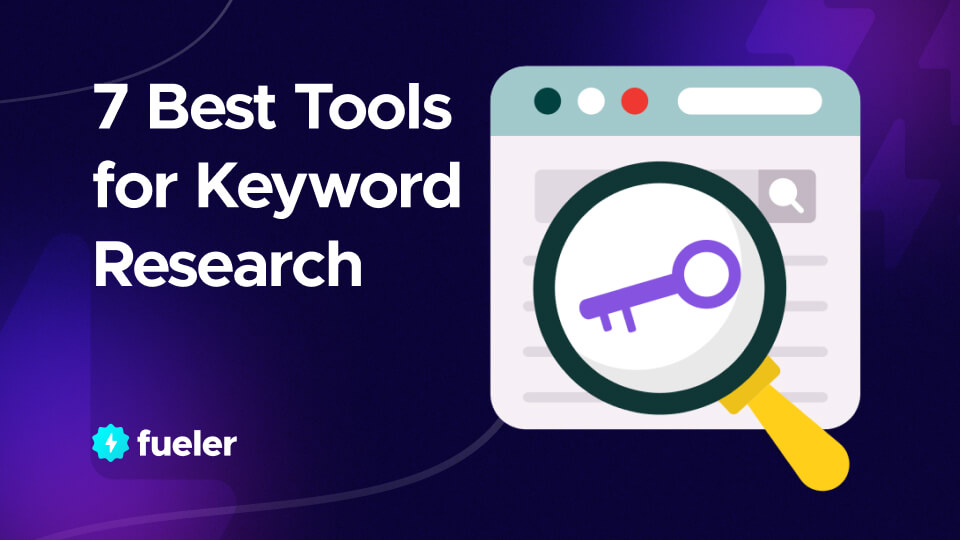7 Best Tools for Keyword Research 2025

Team Fueler
28 Oct, 2024

Keyword research is one of the fundamental aspects of Search Engine Optimization (SEO) and Content Marketing. It helps marketers understand what their audience is searching for, allowing them to create content that meets those needs. Here are seven of the best tools for keyword research, ranging from free options to advanced paid solutions.
1. Google Keyword Planner
Overview: Google Keyword Planner is a free tool primarily designed for advertisers, but it is also invaluable for SEO keyword research. It provides insights into keyword search volume, competition, and related keywords.
Features:
Search Volume Data: Offers average monthly searches for keywords.
Keyword Suggestions: Generates ideas based on seed keywords.
Cost Estimates: Provides insights into potential costs if you were to run ads.
Best For: Beginners looking to start their keyword research without any financial investment.
2. SEMrush
Overview: SEMrush is a comprehensive SEO tool that offers a robust suite of features for keyword research, including the Keyword Magic Tool, which draws from a vast database of over 25 billion keywords.
Features:
Keyword Overview: Provides detailed metrics on any keyword.
Competitor Analysis: Discover what keywords competitors rank for.
Personal Keyword Difficulty Score: Helps identify easier keywords to rank for based on your domain.
Best For: Intermediate to advanced users who need detailed insights and competitive analysis.
3. Ahrefs
Overview: Ahrefs is another powerful SEO tool that excels in keyword research. It offers various features, including a keyword generator and site explorer.
Features:
Keyword Explorer: Provides search volume, keyword difficulty, and related keywords.
Content Explorer: Identifies popular content related to specific keywords.
SERP Analysis: Offers insights into the top-ranking pages for any keyword.
Best For: Users who require in-depth analysis and data-driven insights for their SEO strategy34.
4. Moz Keyword Explorer
Overview: Moz Keyword Explorer is known for its user-friendly interface and straightforward data presentation. It provides essential metrics without overwhelming users with too much information.
Features:
Keyword Difficulty Score: Indicates how hard it will be to rank for a keyword.
Search Volume Estimates: Monthly search volume data.
SERP Analysis: Insights into current ranking pages for your selected keywords.
Best For: Beginners and intermediate users looking for an accessible yet effective keyword research tool41.
5. AnswerThePublic
Overview: This unique tool visualizes the questions people are asking around specific keywords. It's particularly useful for generating long-tail keywords and content ideas for niche markets (like tiny homes for sale Vermont) where specialized terminology is essential.
Features:
Question-Based Keywords: Displays questions related to your seed keyword.
Visualization Tools: Presents data in an easy-to-understand format.
Content Ideas Generation: Helps identify topics that resonate with audiences.
Best For: Content creators looking to develop articles or blog posts that answer specific audience questions23.
6. Google Trends
Overview: Google Trends allows users to explore trending topics and see how interest in specific keywords changes over time. This tool is essential for identifying seasonal trends and emerging topics.
Features:
Trend Analysis Over Time: Visualizes how search interest changes over time.
Comparative Analysis: Compare multiple keywords to see which one has more interest.
Geographical Insights: Shows where searches are most popular.
Best For: Marketers looking to capitalize on trending topics or seasonal searches23.
7. Ubersuggest
Overview: Ubersuggest is a free tool that provides a wealth of information about keywords, including search volume, competition level, and suggestions based on your input.
Features:
Keyword Suggestions and Variations: Generates related keywords based on your seed term.
SEO Analyzer Tool: Offers insights into the SEO performance of your website.
Content Ideas Based on Keywords: Helps identify popular content ideas associated with specific keywords.
Best For: Beginners who want a straightforward tool with a decent amount of features without any cost13.
Conclusion
Choosing the right keyword research tool depends on your specific needs, budget, and level of expertise. For beginners, starting with free tools like Google Keyword Planner or Ubersuggest can provide valuable insights without financial commitment.
As you become more experienced and require deeper analysis, investing in tools like SEMrush or Ahrefs can significantly enhance your SEO strategy. By leveraging these tools effectively, you can ensure that your content aligns with what your audience is actively searching for, ultimately driving more traffic to your site.
About Fueler:
Fueler is a career portfolio platform that helps companies find the best talents for their organization based on their proof of work.
You can create your portfolio on Fueler, thousands of freelancers around the use Fueler to create their professional-looking portfolios and become financially independent. Discover inspiration for your portfolio
Sign up for free on Fueler or get in touch to learn more.


